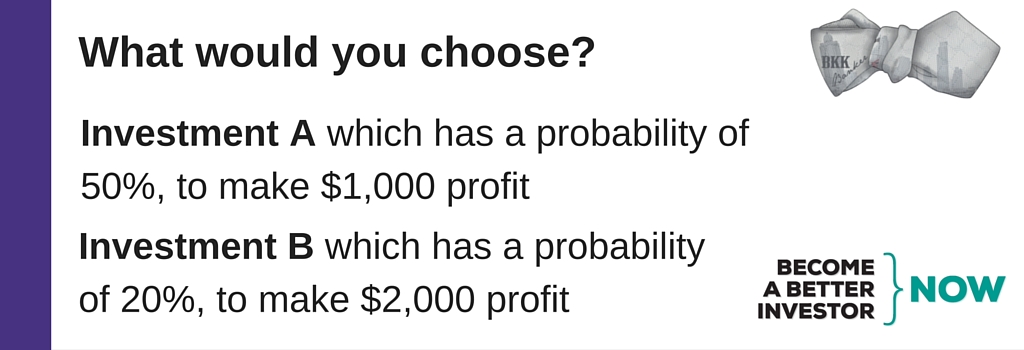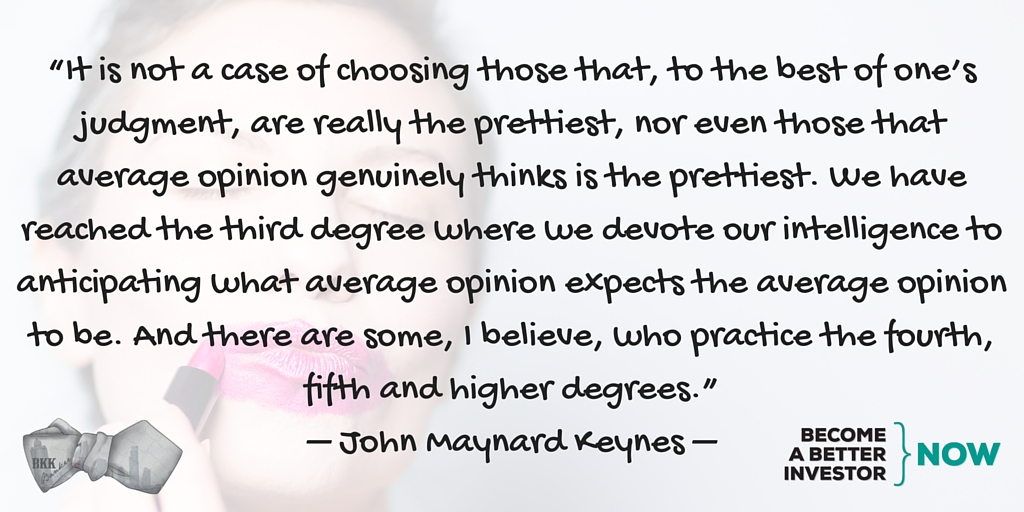How Rational is the Market?
I asked you in a previous blog just how rational YOU are, to follow in this post we’ll instead focus on OUR aggregate rationality, i.e. the aggregate rationality of many individuals, or to word it easier; the market. You’ll discover how we are much smarter together rather than alone.
And even though I believe that is true, I will let you know why I don’t think that is the case for stock markets, and why the market is more like a beauty contest.
The Rational Market
Assuming the stock market participants consist of rational investors, it’s fair to assume the market should be rational or efficient too. Market efficiency is defined as the true value of a certain stock reflected in its market price at any point in time. In a previous post we looked at the following investment choice example:
If an investor has two investment options to choose between:
If the decision-making process follows according to the expected utility theory (EUT) that I described in the post; the investor should choose Investment A. It has the highest expected value of $500, compared to Investment B that has an expected value of $400 (as 50% x $1,000 = $500, and 20% x $2,000 = $400).
How Come There is Daily Trading in the Stock Market?
There are numerous reasons but let’s keep it simple and just say that investors’ math skills differ, and they come up with different expected values for Investment A, and B. Investment A and B could be any instrument, but let’s continue and think about it as two stocks; called A and B and focus on Stock A, which according to EUT has a value of $500.
Investor 1 doesn’t have a calculator, failing math since primary school he does the calculation in his head and comes up with a value of Stock A as only $350. Investor 2, an A grade student with a calculator, knows the true value of $500 and offers Investor 1 anything above $350 and then there will be a trade.
However, stock markets have thousands of participants and due to that, there will be numerous estimates and numerous trades involved as markets’ function, this will end up in Stock A trading at a price of $500. Hence, its true value and so the market is efficient.
The Wisdom of Crowds
Central to the concept of markets and market efficiency is vox populi or the wisdom of crowds. In 1907, Galton went to the market and asked roughly 800 people or so to guess the weight of an ox. The median guess was that the ox weighed 1,197 pounds, and it turned out its actual weight was 1,198 pounds; which is a very small error.
Now you can just imagine that even if there are thousands of people guessing, you probably feel quite confident that the price of a certain stock will be equal or extremely close to its true value.
Requirements for Wise Crowds
Galton’s work has been built upon in more recent years, and there is still evidence for the wisdom of crowds. In a book named just that, The Wisdom of Crowds, James Surowiecki defined four requirements for wise crowds:
- A diversity of opinions, i.e. that the many different opinions involved are also different in themselves in the sense that they’re based on each individuals’ experience, informational advantage, or at least, the belief that they know something that others don’t and that it’s reflected in their guess.
- Independent guesses, you asking your friend about the value of a certain stock and her saying it is $100, therefore, you also guessing $100 or something very close is not the definition of an independent. Everyone needs to make their value estimates independent of others.
- Being decentralized, or meaning that the guesses come from many places with different types of people reflecting, or being affected by local or specialist knowledge.
- The aggregation of guesses, a system that can aggregate all those guesses and make it a collective guess; a stock exchange is an example of such a mechanism as the price of traded stocks will be the result of many different investors’ estimates/guesses.
Of the four above I don’t see any issue with the latter two requirements. Stock exchanges are functional mechanisms to aggregate guesses or estimates of the value of a certain stock, and it is most often decentralized in the sense that anyone with a brokerage account can participate. In most markets due to internet and globalization, this means you can be whoever, located wherever in the world, and still participate.
Why Crowds May Not Be Wise
It’s the first two requirements that make me doubt the wise crowd, at least in a stock market context. How independent are guesses really? People read similar newspapers, use similar data sources, and listen to similar opinions broadcast across various media. Do you believe you or anyone else can truly be uninfluenced by any of this? Or that you don’t at least consider even a small part of this information when making a guess about the future?
I personally doubt that we can be unaffected by it, and therefore, we have to question the independence of our guesses. If you disagree and think that my opinion is questionable or even wrong, I would love to hear more about it and discuss it further with you in the comments section below. As that’s how we learn and become better.
If you do agree with my opinion, that guesses or estimates about the value of a stock traded on a stock exchange are far from independent, then you may already have figured out that a lack of independence in estimates will also lead to less diversity in the estimates or opinions. As these two requirements aren’t fulfilled in the stock market, stock markets are not a wise crowd, and hence, not rational or efficient.
How a Stock Market Actually Works
Let’s say you have estimated the true value of a stock that you bought for $50 to be $100. One day the bids for buying this stock reach and exceed $100, and so as nothing has changed you will sell the stock for $100 or more.
However, you see the share price continue to rise in the coming days, and then you read on Bloomberg that analysts from Goldman Sachs, J.P. Morgan, and Credit Suisse say that this stock will be trading at $300 in a year from now.
Let’s pretend that these big banks’ recommendation have an influence on market participants’ estimated value of the stock, and a substantial group of investors also start to believe that the stock is worth a lot more and will trade about $300, or at least, $250 in a year from now.
Hence, estimates don’t fulfill the independence nor diversity requirements of wise crowds. You think this is the case, and see the stock is trading at $130 now. If a large group think it’s worth $250-300, why not buy the stock, hold it for a while and then sell it at a higher price later to those guys? Yes exactly, why not?!
Just Avoid Being the Greater Fool
Your estimate of the true value is still $100, but you can buy it for $130 now, and you are confident that there is a large group of investors that believe it’s worth even more, at least $200. Easy money! You buy it for $130 and 6 months later it trades at $200 and you sell it again. This kind of game can go on for a long time and with most of the stocks in a market, it is what is commonly referred to as a bull market.
As you can see the true value of the stock (assuming that it can be determined) or your estimate of it, don’t really matter, the only thing that matters to make money is if you’re on the right side of the market. You only need to avoid being the greater fool; there are always buyers at a higher price and you’ll make money irrespective of the true value or your estimated value of the stock.
The Market is More Like a Beauty Contest
There is something in the economics and finance world referred to as the Keynesian beauty contest, it is an analogy created by Keynes; a fictional newspaper beauty contest about the stock market and its participants.
The newspaper contest was to select the six most beautiful people from among 100 photos, and the participants choosing the most voted for would win a prize. The point here is that the best strategy to win the contest is not to pick the six photos that you find most attractive, but rather to guess and pick the ones that the majority of the other participants would find most attractive.
I’ll leave you with this, and hope I have woken some questions in your mind about the rationality and efficiency of markets. To me, the stock market looks more like a beauty contest, and a place where people play the game of not being the greater fool. Rather than, as it should be; an efficient pricing mechanism that with the help of wise crowds can identify the true value of an asset.
Do you believe that markets are efficient? Do you think the Efficient Market Hypothesis holds up?
Do you believe stock #markets are efficient?
(Please RT for more votes)
— Alexander Wetterling (@BkkBanker) April 1, 2016
I’d love to hear from you in a comment below.
Feel free to share this article with your friends.
DISCLAIMER: This content is for information purposes only. It is not intended to be investment advice. Readers should not consider statements made by the author(s) as formal recommendations and should consult their financial advisor before making any investment decisions. While the information provided is believed to be accurate, it may include errors or inaccuracies. The author(s) cannot be held liable for any actions taken as a result of reading this article.


